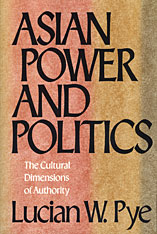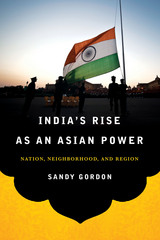
In a major new book, Lucian W. Pye reconceptualizes Asian political development as a product of cultural attitudes about power and authority. He contrasts the great traditions of Confucian East Asia with the Southeast Asian cultures and the South Asian traditions of Hinduism and Islam, and explores the national differences within these larger civilizations.
Breaking with modern political theory, Pye believes that power differs profoundly from one culture to another. In Asia the masses of the people are group-oriented and respectful of authority, while their leaders are more concerned with dignity and upholding collective pride than with problem-solving. As culture decides the course of political development, Pye shows how Asian societies, confronted with the task of setting up modern nation-states, respond by fashioning paternalistic forms of power that satisfy their deep psychological craving for security. This new paternalism may appear essentially authoritarian to Western eyes, but Pye maintains that it is a valid response to the people’s needs and will ensure community solidarity and strong group loyalties. He predicts that we are certain to see emerging from Asia’s accelerating transformation some new version of modern society that may avoid many of the forms of tension common to Western civilization but may also produce a whole new set of problems.
This book revitalizes Asian political studies on a plane that comprehends the large differences between Asia and the West and at the same time is sensitive to the subtle variations among the many Asian cultures. Its comparative perspective will provide indispensable insights to anyone who wishes to think more deeply about the modern Asian states.

India’s Rise as an Asian Power examines India’s rise to power and the obstacles it faces in the context of domestic governance and security, relationships and security issues with its South Asian neighbors, and international relations in the wider Asian region. Instead of a straight-line projection based on traditional measures of power such as population size, economic growth rates, and military spending, Sandy Gordon’s nuanced view of India’s rise focuses on the need of any rising power to develop the means to deal with challenges in its domestic, neighborhood (South Asia), and regional (continental) spheres.
Terrorism, insurgency, border disputes, and water conflict and shortages are examples of some of India’s domestic and regional challenges. Gordon argues that before it can assume the mantle of a genuine Asian power or world power, India must improve its governance and security; otherwise, its economic growth and human development will continue to be hindered and its vulnerabilities may be exploited by competitors in its South Asian neighborhood or the wider region. This book will appeal to students and scholars of India and South Asia, security studies, foreign policy, and comparative politics, as well as country and regional specialists.
READERS
Browse our collection.
PUBLISHERS
See BiblioVault's publisher services.
STUDENT SERVICES
Files for college accessibility offices.
UChicago Accessibility Resources
home | accessibility | search | about | contact us
BiblioVault ® 2001 - 2024
The University of Chicago Press









